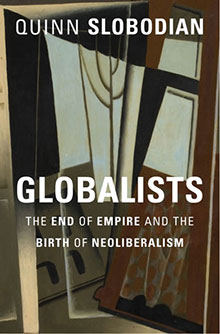From Vienna to the WTO
Quinn Slobodian
Globalists: The End of Empire and the Birth of Neoliberalism
Harvard University Press, Cambridge, MA, 2018, 440 pp., $45
NEOLIBERALISM IS NOW the go-to moniker for everything that went wrong in the late 20th century and the new millennium. Often a term of abuse, it is a synonym for a crassly materialistic and superficial belief in the inherent superiority of markets. Its standard bearers were British Prime Minister Margaret Thatcher and US President Ronald Reagan.
Today many prominent figures, such as Charles Moore (Thatcher’s official biographer), Oliver Letwin (a British Conservative intellectual), and the writer David Frum cry mea culpa and complain that greater home ownership has produced more debt than security and that flexible labor markets are a threat rather than an opportunity.
Slobodian aims in his latest book to trace an intellectual history from the Habsburg Empire and the glittering intellectual culture of Vienna to the World Trade Organization. He argues that the eventually dominant vision of economic order cared less about liberty and laissez faire and the legacy of Adam Smith than about protection of property against radical political demands that followed from both socialism and nationalism.
The book is less interested in the financial infrastructure of globalization than in the makings of today’s trade regime. Some delightful insights show how many modern views of globalization— threatened by tariff walls, vulnerable to a spiral of declining trade—originated in Vienna. Clive Morrison-Bell, at the Vienna Chamber of Commerce, built a physical model of Europe with wooden tariff walls; Oskar Morgenstern, at the Vienna Institute for Business Cycle Research, graphically depicted the shrinking world trade of the Great Depression.
Slobodian places his genealogy above that of the Virginia (public choice) and Chicago (monetarism and deregulation) schools. The key players in the new story—Friedrich Hayek and Wilhelm Röpkes—were reacting to three shocks: World War I, the Great Depression, and decolonization. In response, these intellectual pioneers turned to international institutions to provide a regime that guaranteed property rights and international division of labor based on stability. The original candidate for the guarantor of a supranational non-territorial was the International Chamber of Commerce, then subsequently the League of Nations.
Slobodian’s heroes of neoliberalism viewed this order as a necessary balancing of the political business of democratization. Without limits, democracy might make too many (unfulfillable) promises. Domestic constitutional order could be a constraint, but that order would be more secure if anchored in an international legal framework.
Slobodian has produced a deep and interesting book, though perhaps not deep enough. He proposes that his heroes are defending property just to protect the status quo. But that interpretation is not convincing: the interwar fathers of modern neoliberalism were responding to a 1930s world of arbitrary confiscation of property—often based on national, racial, or religious identity—that was an intrinsic part of marginalization, dehumanization, and ultimately destruction. Their analysis cannot be used to object to taxation, even high and progressive taxation, as long as it is equally and impartially applied. The defense of property was a part of, and emanated from, deeper concern with the protection of human dignity.
Opinions expressed in articles and other materials are those of the authors; they do not necessarily reflect IMF policy.










